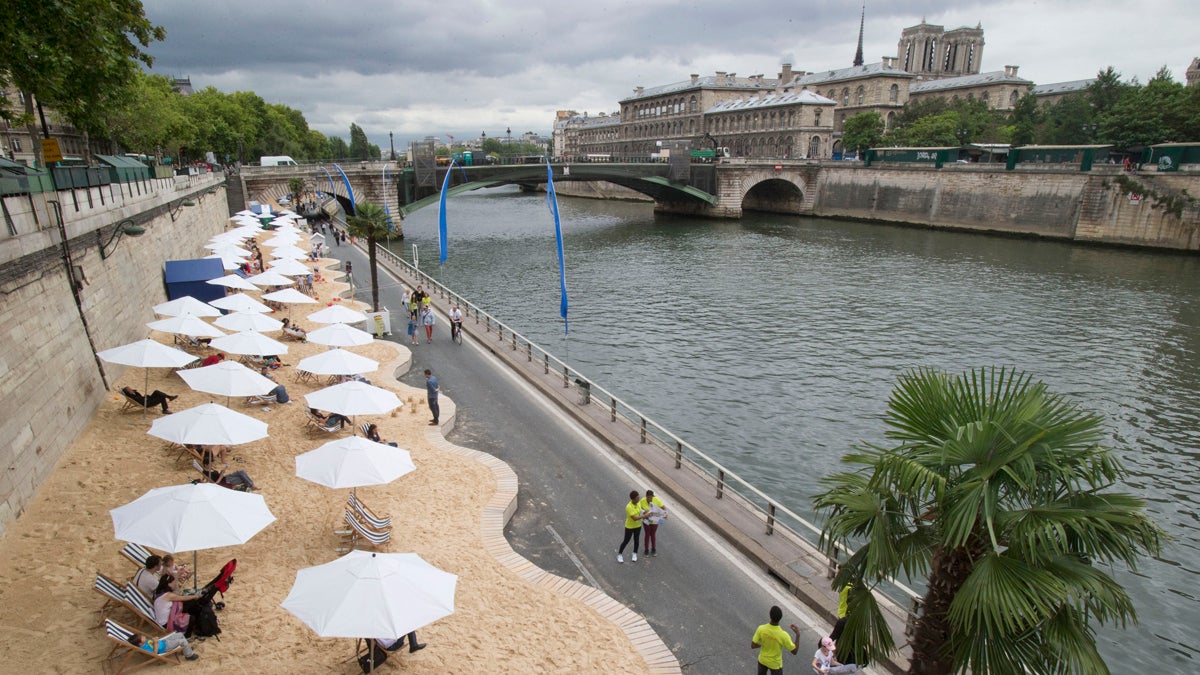Ideas Worth Stealing: A competition to bring urban innovation to forgotten properties

Tourists and Parisians take advantage of Paris Plage, an artificial beach set up on the right bank of the Seine river with palm trees, outdoor showers and hammocks in Paris, France, Monday, July 20, 2015. (AP Photo/Michel Euler)
Urban design competitions can bring international talent and innovative ideas to cities — should Pa. cities consider hosting such competitions?
Ideas Worth Stealing: Every week, Keystone Crossroads will look to cities across the world for lessons in urbanism and municipal governance that could benefit Pennsylvania. No city does it all right, and we hope these examples from metropolises near and far inspire and encourage cities here to think outside the box.
When you think of Paris, a modern, innovative city is probably not the first thing that comes to mind. But a slew of recent initiatives – going carless for a day, reducing speed limits, turning riverside streets into beaches for urban dwellers to enjoy – are signaling a new kind of Paris, one embracing modern urbanism. Another initiative pushed by Paris Mayor Anne Hidalgo is an international competition called Reinvent Paris. It looks to architects from around the world to design and redevelop sites throughout the city.
The mayor’s office chose 23 sites in Paris, including everything from a high-rise office building on the Seine River, to empty lots, to an old bathhouse, and an electric sub-station. Some of the sites are not in use while others are occupied, but all are in strategic parts of the city. The competition invites architects, working with landscapers, investors, designers and other relevant collaborators, to submit proposals for a site. Winners are chosen through a multi-step process based on the potential for urban innovation — innovation in how space is used and what space is used, environmentally friendly designs, etc. — and can rent or buy the property for their project. Projects can be financed by private or public money, but not by city money. According to Jean-Louis Missika, Deputy Mayor of Paris, “with Reinvent Paris, our aim is to “reinvent” the ways in which we think about and make cities.”
A competition – versus a bidding process, for example – can lead to rich ideas for a city looking to try something new. The American Institute of Architects actually has a handbook for design competitions, which enumerates appropriate and inappropriate conditions for a contest. If a project requires “a wide degree of design exploration,” is on an important site, will have “a great beneficial influence on subsequent design work,” and “will benefit from the additional public interest,” a competition might be a good idea. If Paris is indeed looking for innovation and fresh ways to think about the city, then check, check, and check. According to an Australian urban policy firm’s, SGS Economics and Planning’s best practices for urban renewal, “design competitions attract international entrants and are viewed by some designers as a means to test innovative approaches or design styles that may not be appropriate in traditional ‘real’ projects.”
What’s interesting in Paris, too, is the scale. With 23 sites being simultaneously considered and, presumably, developed, these innovative projects could really change the physical landscape of the city and how it’s used, causing a snowball effect of wider rethinking of the status quo.
In Pennsylvania, many cities are dealing with vacant properties and undergoing their own rethinking. While some cities, like Philadelphia and Pittsburgh, are working on ways to make redevelopment easier and faster, a broad competition encompassing various parcels could bring in fresh ideas and drive the rebirth of the Commonwealth’s urban centers in new directions.
WHYY is your source for fact-based, in-depth journalism and information. As a nonprofit organization, we rely on financial support from readers like you. Please give today.


